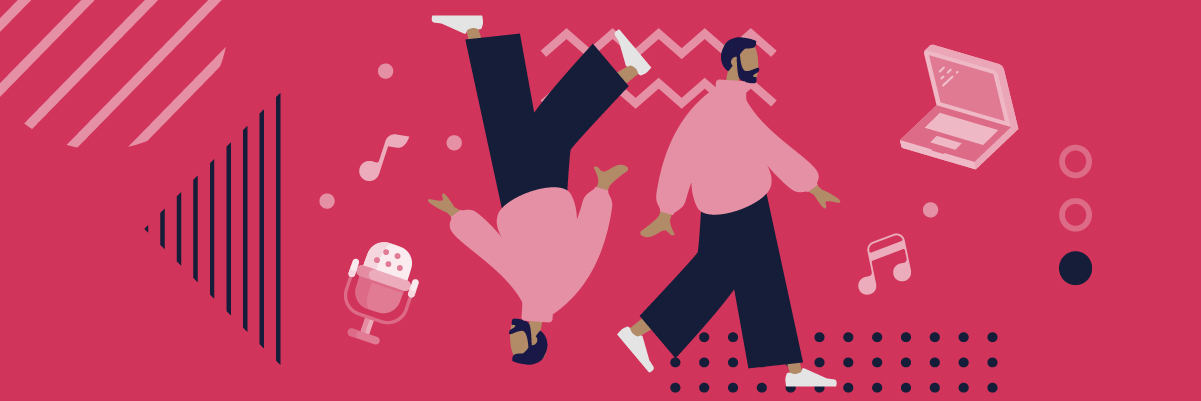So, you want to tackle music production and you need a computer to tackle all your needs. It all started out that you couldn’t produce music outside of a professional studio. Then, when computers started getting better and more sophisticated, you could do things at an improvised studio or home. But for that, you needed a big, hefty machine, even machines. These days, when most musicians and DJs are on the move it is laptops that are taking over. So, the question is, what are currently the best laptops for music production, and why?
Well, let us start briefly with the process of music production.
According to LANDR, “music production is the process of developing, creating, and refining recorded music for public presentation. Music production can refer to the entire lifecycle of a piece of music—from songwriting and composition to recording and sound design to mixing and mastering.” To do that professionally, music producers need the best possible equipment available.
These days, “every workflow in modern music production has one thing in common—digital tools.”To do so, any stationary computer or laptop has to be equipped with an adequate digital audio workstation or DAW.
In the traditional recording process, a music producer acts in a similar way to the director of a film. They create a vision for the material and advise the musicians artistically on how to realize it.
During a recording session, the producer acts as a coordinator and provides organizational help. They also offer creative input and notes on the musicians’ delivery and the technical choices made by the engineer (above).
Today, more and more artists are opting to self-produce. This is the case even within traditional genres like rock, indie or singer-songwriter. That is why the choice of quality hardware and software has become such a key question.

Choosing the right machine
Why do musicians and all those involved lookouts for the best laptops for music production?
The reasons for that are very solid. First of all, the quality and capability of stationary computers and laptops are on par these days. It is also often the case that some specialized laptops, like gaming machines, can handle certain tasks better than stationary machines.
Secondly, when music production is the job, laptops are mobile and can be placed almost anywhere. As mentioned, if you are on the move, at a concert, or on a set recording or mixing music for say a music video, the laptop is the only viable option.
As Music Radar notes, for any DJs or traveling musicians reading this, weight – and portability – is likely to be another major factor. After all, some of the highest spec, beefiest laptops in the world also weigh a fair amount. “So, the best laptop for music production should be powerful and lightweight, while also rocking a good battery capacity, for those situations where you’re away from mains power.”
So, what are the things you should look for in a music production laptop? You should consider these factors (consordini.com):
- Operating system: Do you want a Mac? A Windows computer? Or do you want something with a different operating system, like Ubuntu, for example? This all comes down to personal preference but it also has to do with the DAW you’ll be using. Some DAWs only work with Mac, some only work with Windows.
- Your DAW: What’s your DAW of choice? Is it compatible with Mac or Windows or both? Is it hard to navigate through on a smaller screen? Does it require a computer with a lot of memory or CPU when using plugins?
More on choosing the right machine
- Your plugins: You may already have experience working with different audio plugins in your DAW. You may already have a suite of plugins in mind that you’d like to use. Think about them. Are they graphics-heavy? Do they require a lot of computer power?
- How you mix: Are you the type of person who likes to use only a few plugins, or do you come up with elaborate signal chains? Do you typically make songs that have many audio tracks, or just a few?
- Preparedness for future projects: Who do you anticipate working with? Will they want or need a lot of plugins? Will they likely have a lot of audio tracks?
- Studio size: How big is your studio? Are you a bedroom producer, or do you have a professional-grade studio to work in?
- Portability: Do you plan on taking your computer with you to work on projects at other studios or while you’re on the go, or will it stay in one location?
The following step involves focusing on the specifications of the laptops you have potentially shortlisted. Here are the key factors:
- CPU – CPU stands for Central Processing Unit. It is the main component of a computer that processes instructions. CPU affects the speed of your computer and how much work it can take on.
- RAM – RAM stands for Random Access Memory. RAM chips only remember information when a computer is powered on, so it’s used for storing information that a computer is working on only in the very short term.
- Storage drive – There are two types of storage drives: hard disk drives (HDD) and solid-state drives (SSD). In most cases, traveling musicians prefer SSD’s. The reason is simple. Hard drives slow down as you put more and more files on them, SSD’s don’t. That’s why if you upgrade your HDD to an SSD you will speed up your mac or PC.
Have PCs and UNIX machines caught up with Apple?
As Music Radar (above) notes, “for years now, Apple has produced some of the best laptops for music production. As the only portable platform for Logic Pro X, the Apple MacBook Pro is synonymous with the craft of music-making. By comparison, those of us using a PC have traditionally been chained to the desktop format, but that has changed considerably in recent years. Dell, Microsoft, Samsung, MSI, Asus, Lenovo, and other big tech brands are all muscling in to give Apple a serious run for its money, and some of them have proper music-making clout too.”
Best laptops for music production – Apple choices
Any music producer and musician got used to working with Apple laptops and software that can run them. This is particularly the case with the above-mentioned, Logic Pro X.
If this is the route you want to take, there are currently two best choices among Apple laptops:
- Apple MacBook Pro M1 13” – Key specifications: CPU: Apple M1 | Graphics: Apple M1 | RAM: 8-16GB | Screen: 13.3” Retina display (2560 x 1600p) | Storage: 256GB – 2TB – According to Music Radar, Apple’s new in-house M1 chip does seem to perform streets ahead of its competition, promising unprecedented boosts in speed, performance, and battery life. It does this by combining CPU, GPU, and memory into one chip, greatly reducing power usage and delivering a hugely optimized computing experience.
“While having a powerful machine is one part of the equation, we’re also reliant on the hardware playing nicely with the software packages we use in our work. As you’d expect, Logic Pro X and Garageband users can immediately take advantage of all this extra optimization, but for users of Live, Cubase, Pro Tools et al the picture is less clear. Full support will be available in the future, that goes without saying, but currently, it’s not quite there enough to make a full recommendation.” - Apple Mac Book Pro 16-inch (2020 model) – According to Consordini, Apple has the best laptops for audio production in general, or if you prefer Apple’s operating system and hardware over Windows’. The MacBook Pro has been a standard in music production for years and continues to hold that title as the best overall laptop.
Specifications: CPU: 6-core Intel Core i7 – 8-core Intel i9 | Graphics: AMD Radeon Pro | RAM: 16GB – 64GB | Screen: 16” Retina display with True Tone (3072 x 1920) | Storage: 512GB SSD – 8TB SSD.

Best laptops for music production – PC choices
- Dell XPS 13 (2020) – This is the first choice among PC music production laptops for most specialists. Specifications: CPU: 10th Gen Intel Core i5 – i7 | Graphics: Intel Iris Plus | RAM: 8GB – 16GB | Screen: 13.3” FHD (1920×1080) | Storage: 256GB – 1TB SSD. Dell seems to be the closest Windows alternative to an Apple MacBook Pro, the Dell XPS line has built up a strong reputation thanks to its sleek design, gorgeous screens, and powerful spec (Music Radar). “The 2020 version packs in an updated 10th-generation Intel Core i5 or i7 processor and a quite spectacular bezel-less screen which keeps the overall package thin and lightweight. There’s a beefier 15” model further up the range, but for most people, the Dell XPS 13 (2020) makes for a pretty compelling package. “
- Razer Blade Stealth 13 – Consordini thinks this is the best ultrabook for music production. “This laptop is incredibly sleek and visually stunning. It features up to 4K resolution QHD+ 3200 X 1800 touch display giving it incredible graphics in a thin bezel 13.3” display. This in addition to a new Razer Chroma keyboard, the Razer Blade Stealth combines both mobility and style with power that makes it perfect for music production and gaming if that is something you would want to use it for as well.
- MSI GF63 Laptop – Both Music Radar and Consordini agree that this is the best machine for music producers that are concentrating on making the beats. The GX63VR is heavier and a little bigger, but it has some extra features that make it well worth it to consider as an option if you need somewhere to keep all your samples and recordings while simultaneously using graphics-heavy plugins and projects with a lot of tracks (Consordini).
Concluding remarks
The above five choices are those among machines that have their place on most of the lists of best laptops for music production. Ultimately, whether you work as a freelancer or say, with a video production agency working on music videos, the choice depends on you.
But, if you want to leave your music production to an experienced freelance professional, it might be a good idea that you contact BunnyStudio, which can help you with your choice.










